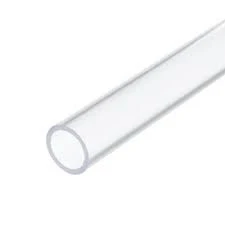Nov . 23, 2024 02:43 Back to list
150mm pvc pipe
Understanding 150mm PVC Pipe Applications and Advantages
In the world of plumbing and construction, pipes are fundamental components that facilitate the transportation of liquids and gases. Among the various types of pipes available, PVC (Polyvinyl Chloride) pipes have gained significant popularity due to their versatility, durability, and cost-effectiveness. This article focuses on 150mm PVC pipes, exploring their applications, benefits, and installation processes.
What is a 150mm PVC Pipe?
A 150mm PVC pipe refers to a pipe made from polyvinyl chloride with a nominal diameter of 150 millimeters (approximately 6 inches). This specification indicates the internal diameter of the pipe, which is critical for determining the flow capacity and suitability for various applications. PVC pipes are manufactured through a process that involves polymerization of vinyl chloride monomers, resulting in a lightweight yet strong material ideal for plumbing, drainage, and infrastructure projects.
Applications of 150mm PVC Pipes
150mm PVC pipes are widely used in diverse fields, such as
1. Drainage Systems They are commonly employed in wastewater and stormwater drainage systems. Their smooth internal surface minimizes friction and enhances flow efficiency, making them ideal for carrying away excess water.
2. Sewage Systems In municipal sewer systems, 150mm PVC pipes are often used to transport sewage from residential and commercial buildings to treatment facilities. Their resistance to corrosion and chemicals ensures longevity in harsh environments.
3. Irrigation Agriculture benefits from the flexibility and durability of PVC pipes. 150mm pipes are frequently used in irrigation systems to distribute water efficiently over large areas.
4. Electrical Conduits In addition to fluid transport, these pipes can serve as conduits for electrical wiring, providing protection against environmental elements.
5. Industrial Applications Various industries utilize 150mm PVC pipes for the movement of chemicals and other fluids due to their impermeability and strength.
Advantages of 150mm PVC Pipes
1. Durability and Longevity PVC pipes are highly resistant to corrosion, chemicals, and UV exposure. They do not rust or rot, significantly extending their service life compared to metal or concrete alternatives.
150mm pvc pipe

2. Lightweight and Easy to Handle Compared to traditional piping materials, PVC pipes are lightweight, making them easier to transport and install. This characteristic can significantly reduce labor costs on construction sites.
3. Low Maintenance Once installed, 150mm PVC pipes require minimal maintenance. Their smooth surfaces resist clogs and buildups, which translates to fewer repairs and longer intervals between inspections.
4. Cost-Effectiveness The initial cost of PVC pipes is generally lower than that of metal or concrete pipes. When factoring in their long service life, low maintenance requirements, and energy-efficient production processes, PVC pipes offer excellent value over time.
5. Environmental Considerations PVC production has seen improvements in sustainability. There are ongoing efforts to recycle PVC materials, contributing to a circular economy and reducing waste.
Installation Considerations
When installing 150mm PVC pipes, several key factors should be taken into account
1. Proper Sizing Ensure that the pipe diameter suits the application. A 150mm pipe may be too large for some residential needs, thus proper evaluation is essential.
2. Jointing Methods PVC pipes can be joined using solvent cement, which creates a strong bond. However, it is vital to follow the manufacturer’s instructions for the best results.
3. Alignment and Support During installation, pipes should be aligned properly and supported adequately to prevent sagging or misalignment.
4. Local Regulations It is crucial to be aware of local building codes and regulations governing the installation of pipes to ensure compliance and avoid potential issues.
Conclusion
In summary, 150mm PVC pipes offer a robust solution for various applications, particularly in drainage and wastewater management. Their durability, cost-effectiveness, and minimal maintenance make them an ideal choice for builders and contractors alike. Understanding the advantages and proper installation methods of PVC pipes can significantly enhance project efficiency and longevity, positioning them as a staple in modern construction and infrastructure projects. As we move towards innovative and sustainable building practices, PVC pipes will likely continue to play a pivotal role in the industry.
-
Durable PP Rigid Sheet: Lightweight, Chemical Resistant Solutions
NewsAug.21,2025
-
PVC Grey Sheet for Extraction: Chemical Resistant & Durable
NewsAug.19,2025
-
Durable PVC Pipe Fittings for Plumbing & Irrigation Needs
NewsAug.18,2025
-
HDPE Steel Belt Reinforced Spiral Corrugated Pipe | High Strength
NewsAug.17,2025
-
HDPE Pipe Fittings: Durable, Leak-Proof Solutions
NewsAug.16,2025
-
Premium CPVC Sheet: High-Temp & Chemical Resistant Solutions
NewsAug.15,2025

